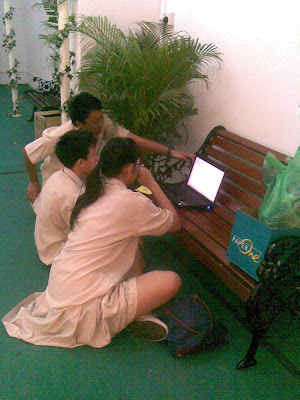.jpg) Part of the GP Programme Module is the Entrepreneurship Module where students have to propose a business plan and sources for materials and goods for their business when they are in Vietnam. They are given a limited capital to work with.
Part of the GP Programme Module is the Entrepreneurship Module where students have to propose a business plan and sources for materials and goods for their business when they are in Vietnam. They are given a limited capital to work with.For this module, Mrs Audrey Koh has been the ever smiling "market consultant", guiding the students, teaching them how to bargain and analyse the market trend.
In this module, students are taught the following concepts:
a. Profit and lost
b. Supply and demand
c. Analysis of market trend
d. Business plan proposal
e. Constrains (Unlimited wants, limited resources)
f. Proper accounting of all stock, capital, sales and receipts.
.jpg) When they were back in Singapore they took part in the Enterprising Retailing Team Challenge 2008 to see if their business plan worked.
When they were back in Singapore they took part in the Enterprising Retailing Team Challenge 2008 to see if their business plan worked.This competition is jointly organised by Yuying Secondary School, the Association of Commerce Educators Singapore (ACES) and the National Institute of Education (NIE). The students set up a stall at Anchor Point from 7th to 8th June 2008.
.jpg)
Here, you can see the goods that the students have bought from Vietnam.
Wei Ming waiting for business to begin.
.jpg) An overview of our stall.
An overview of our stall..jpg) Students checking to ensure that the accounts are kept correctly.
Students checking to ensure that the accounts are kept correctly..jpg) Ms. Daisy Lim,who teaches Principal of Account, has been teaching us how to keep the a set of proper account.
Ms. Daisy Lim,who teaches Principal of Account, has been teaching us how to keep the a set of proper account..jpg) Carline doing the "Kung Fu Panda."
Carline doing the "Kung Fu Panda.".jpg)
Amanda teaching another student how to promote the goods from Vietnam.
Reflection Questions for those who are involved with this module.
1. Why is it important to keep a proper, accurate and complete account?
2. What must an enterprise have in order for it to be successful?
3. How do you feel when shoppers keep on rejecting you? How do you feel when the sale was successful?
4. What risks did you take? What happens if you could not sell all the goods?
5. After participating in this module would you want to take the risk and be an entrepreneur?

.jpg)
.jpg)
2 comments:
Carlene Yeo
4 Endeavour
What must an enterprise have in order to be successful?
I think the products that we are selling must be unique and reasonable priced. The product must also be practical. After all, you would not want to be something that can only be displayed and nothing else. The goods that we imported was quite practical -wine holders, containers etc.- and i feel, were quite unique as well. We were the only stall there that was selling all these.
How do you feel when shoppers keep on rejecting you? How do you feel when the sale was successful?
Being rejected is part of sales and can be expected. We have to be thick skinned at that point of time (: Just tell yourself that you can do it, that there are other customers who are interested in your products. Why give up the entire fish tank because of one fish? Of course, you have to be eloquent. Make your customers interested in your goods by promoting it. After all, this is what sales is about. When those customers that were initially not interested in your products buy your goods, that moment is what words cannot describe. You'll feel accomplished and would want to do that again(:
What risks did you take? What happens if you could not sell all the goods?
I feel that the greatest risk we took was actually to buy these items back. Firstly, the items were not exactly cheap because we did not get it through suppliers. Second was to buy back handicrafts. Handicrafts are usually expensive and not easily sold. Because of their high cost price, it results in its high selling price. Of course, we have considered this factor. Hence, we invested not in quantity but in the variety of product. We bought back alot of varieties but each with limited quantity. By doing so, even if the customers are not interested in a particular item, we have others to actually interest them. And of course we can tell the customers that the items are all limited edition! This way, our items can be cleared fast without making losses.
After participating in this module would you want to take the risk and be an entrepreneur?
Probably. That would mean that I would have to invest money in it. I will only do so when I have the capabilities. I have taken part in several competitions that involves money (it is expected when you are in Enterprise Club) and have gained valuable experiences. Whether will I be an entrepreneur or not, that really depends. Who knows? I might be holding a job and be an entrepreneur at the same time! (:
Amelia Sam (2)
4 Endeavour
1.Why is it important to keep a proper, accurate and complete account?
It is important to keep a proper, accurate and complete account because we students need to be able to keep track of the amount of goods we sold and as well as the patrons’ response. If the account is miscalculated or it does not tally with the amount at hand, there will be the pushing of blame and friction among the team. It is necessary for the account to be accurate so that we would be able to function well as a team without being suspicious of one another.
2.What must an enterprise have in order for it to be successful?
The enterprise must have creative products that will capture the customer’s first glance. Then the salesmen must have the eloquence of speech into talking the customer into buying things that he/she might not need in the first place. Part of it being successful is that being able to captivate the customers into buying things that they do not need and making money through this.
Moreover, price must be standardised and equal no matter who buys the products, even our family members. The enterprise must not favour someone over another. When the price is identical for everyone, there will not be confusion when selling because it is non-negotiable and it also ensures that the accounts are accurate.
3.How do you feel when shoppers keep on rejecting you? How do you feel when the sale was successful?
By taking rejection into our stride. There were acceptances and rejections so it was kind of expected. I mean it’s not like it’s possible to have 100% acceptances. The important thing is that not to doubt our own abilities but instead move to another customer.
When the sale is successful, there will be a sense of achievement because all that hard core promoting has paid off at last. Then it will be more motivating to try and attract more customers to make better sales.
4.What risks did you take? What happens if you could not sell all the goods?
One of the risks was that whether to choose the fragile products. The products will be able to withstand the strenuous journey on the airplane because they are fragile. We need to ensure that the products are in good condition when we sell them. So we wrapped all those products with newspaper hoping that they would be in their prime condition when going back to Singapore.
Well there are a lot of different varieties but few quantities for each product. These limited stocks ensure that the products will be able to sell faster.
5.After participating in this module would you want to take the risk and be an entrepreneur?
I think that there is a possibility here but only if I have to capacity to do so. But if I were to set up a business, I would not have any friends as my colleagues as business partners. This module has also taught me that money is the bane of all relationships. I do not want to have my friendships to stand trial time and time again for the sake of money. It is just not worth it to have something as common as money to destroy relationships.
Post a Comment